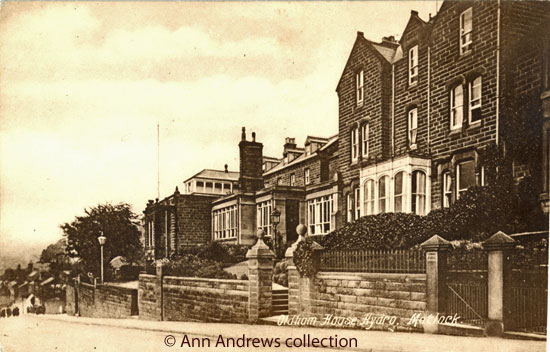|
Images Index> Matlock, 20th and 21stC Images> This page |
| Matlock: Oldham House Hydro, Wellington Street, 1920s |
| Matlock : Twentieth Century Photographs, Postcards, Engravings & Etchings |
|
|||
He was also very musical, singing in local choirs and playing the double bass[4]. About 1900 his hydro became the first place in England from which music was transmitted over the telephone. There had been a musical competition practice at Oldham House one evening, after which the four members of the Male Voice Quartet remained behind to enjoy what was described as a quiet smoke. L. G. Wildgoose had arranged to speak to his brother, who was living in Oldham, about 11p.m. The group decided to give his brother a quick concert so crowded into the hydro's telephone box, closing the door firmly to avoid disturbing the visitors and servants. At the end of the impromptu recital they received praise from an unexpected quarter as the operator had been listening in. "Well I'm d------. I never heard anything like that over a telephone afore. Goodnight, lads, and good luck"[5]. The vehicle's registration was BU 2137 so we know it was registered in Oldham ; although it could have belonged to a guest it would be nice to think it just might have belonged to Edmund Wildgoose, Lubin's brother. It is parked outside the gate of the part of the hydro known as Prospect Place, which is called "Woodlands" today. A small part of the main Oldham House hydro, the single storey conservatory link, also remains along with the dining room block, but the three storey building behind them was demolished some years ago.
George Davis, a cousin of Lubin Wildgoose, was head bathman at Oldham House for 25 years and was said to be an expert in hydropathic treatment, treating not only hydro residents but also visited private houses. The son of Jesse Davis and grandson of Thomas Davis, he had run Poplar Hydro for a time after his father's death and continued working there under Mr. Jeffs until about 1907. He then moved to Oldham House and was working until a few days before his death in 1932[8]. Although the outbreak of the Second World War saw the end of hydropathy at Oldham House, the Oldham House & Prospect Place Hydropathic Company Limited was not voluntarily wound up until an Extraordinary General Meeting on 21 April 1959. Harold Wildgoose was then Chairman and Kenneth MacNeill Black of the firm Mills & Black was appointed Liquidator[9]. The sender of the top card wrote:
|
|||
|
1. "Oldham House, Matlock", published by Charles Colledge, Matlock. Posted 23 Ap 1924 to Miss H Wide, Devon from Ivy, who was staying at Oldham House. 2. "Oldham House Hydro, Matlock". Published by S. Dakin, Tobacconist, Stationer and Hairdressing Salon, Smedley Street. No.11133..1848. Printed in England. Unposted. There is a VL where stamp should go. Postcards in the collection of, provided by and © Ann Andrews. Written, researched by and © Ann Andrews. Intended for personal use only. |
|||
References (coloured hyperlinks are to transcripts elsewhere on this web site): [1]> See the 1891 census | the 1901 census | Kelly's 1912 Directory (under Oldham House) | Kelly's 1916 Directory (under Oldham House). [2] "Derbyshire Times", 28 May 1932. L. G. Wildgoose mentioned this during a Council meeting that was discussing flooding in Matlock Green in 1932. See Schools - British School. [3] He is mentioned as a local councillor in Kelly's 1912 Directory and Kelly's 1916 Directory, under "officials". He went on to be Chairman of Matlock Urban District Council between 1932 and 1938. His name is on the Coronation Medal. [4] He was a member of Matlock Bank Primitive Methodist Church, 'Young Mens' Class | Matlock Primitive Methodist Prize Choir. Julie Bunting's book "Matlock and Matlock Bath" has a photograph of him as a member of Matlock Brotherhood Orchestra. [5] "Derby Daily Telegraph", 6 April 1926. The four in the phone box were Herbert Ballington (the informant), Wilfred Dean, Ted Slater and L. G. Wildgoose. The man they were entertaining in Oldham was Lubin George's brother, Edmund who had lived in Oldham for much of his working life. [6] "Derby Daily Telegraph", 24 December 1928. [7] "Derby Daily Telegraph", 2 October 1928. [8] "Derbyshire Times", 15 October 1932. He lived at Poplar Cottage on Cavendish Road and was survived by his wife and children. George was one of the leaders of the R.O.A.B. movement in the locality. He was 68. [9] Three notices were published in "The London Gazette", two on 5 May 1959 and the final one on 21 August 1959.
|














 See samples of their notepaper
on
See samples of their notepaper
on